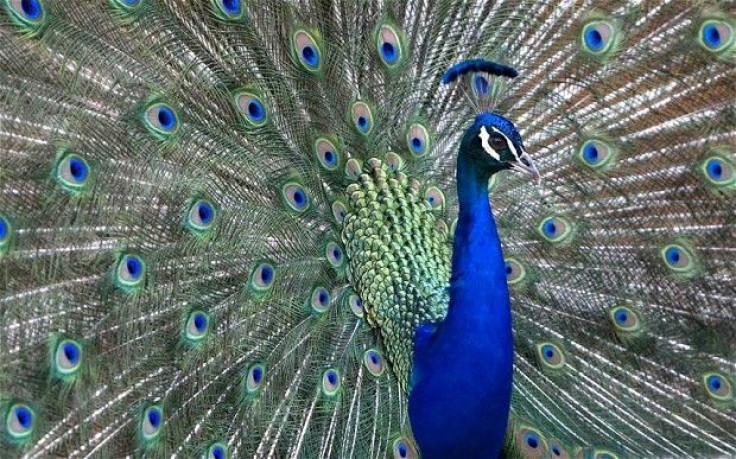Peacocks, Revered Symbol Of Indian Subcontinent, Dying Out From Disease

The peacock, an ancient symbol for both India and Pakistan, are dying out due to a combination of factors, including disease, starvation, diminishing sources of potable water and deforestation.
Pakistani wildlife officials reported on Monday that at least 60 peacocks were founded dead in the Thar desert in the Sindh province. Other reports suggest that more than 100 of the bright-plumed birds had died.
Wildlife ministry officials said they will probe the cause of death.
"Wild peacocks have become susceptible to bacterial and fungal attack, which further suppressed the immunity of the birds that paved the room for viral attack," it said.
Some Pakistani officials fear the birds are suffering from Newcastle disease, a highly contagious avian disease that affects wild birds around the world and is characterized by digestive, respiratory and/or nervous signs.
"We are vaccinating wild peacocks protectively for suspected viral disease, as in 2003 when a few peacocks died from the same symptoms that later proved to be [Newcastle disease]," said Lajpat Sharma, a local wildlife official, according to Agence France Presse (AFP).
Tahir Qureshi of the International Union for Conservation of Nature told AFP that there are estimated to be at least 30,000 wild peacocks in the Thai desert, but their numbers have been steadily declining in recent years.
More of the birds, prized for their beauty and grace, are expected to die next year.
The government-run Sindh Poultry Vaccine Centre (SPVC) warned that a more lethal form of Newcastle disease is likely to emerge, especially in the city of Karachi, where many people keep peacocks as pets.
“Last year, too, the same disease killed many peacocks, though the exact toll could not be verified. This year, the loss seems to be much higher. And it is very likely that the virus could emerge in a more lethal form next year,” SPVC director Dr Nazeer Hussain Kalhor told Pakistan’s Dawn newspaper.
In Pakistan, keeping a peacock as a pet is regarded as a sign of affluence.
Peacocks, the national bird of India, are an ancient symbol of beauty in the subcontinent (and are also prized in China and Iran).
In India, the birds are considered sacred -- Hindus believe that Saraswati, the Goddess of Knowledge and Wisdom, uses a peacock as her mount. The god of rain and war, Indra, is also depicted in the form of a peacock.
However, peacock numbers are also in decline in India due to poaching for their meat and feathers (which is illegal in the country). There are estimated to be only 100,000 peacocks left in India.
© Copyright IBTimes 2024. All rights reserved.











